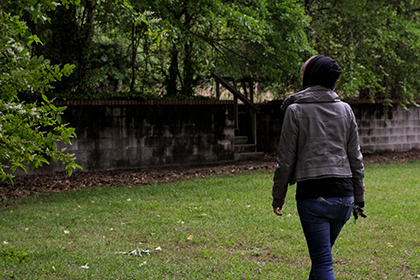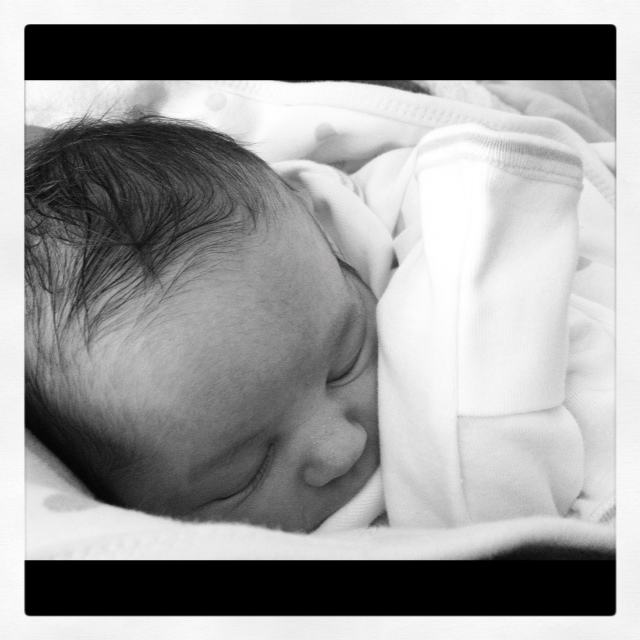“You’re not my daughter anymore.”
“Okay.”
“I am not your father.”
“Okay.”
“Do not try to contact me or your grandparents.”
“Okay.”
“Maybe someday we can have a relationship again, but not as father and daughter.”
“Okay.”
I had a wonderful childhood. My brother and I got good grades, played sports, never got in trouble. We were “good kids.” I don’t have many bad memories or scars that I’ve carried with me, that is, until my parents told us they were getting a divorce. We had no idea it was coming. It didn’t seem like my parents were fighting. The way it happened was so matter-of-fact. Two houses, two Christmases, two TVs; two of everything. It sounded fine: we would spend half our time with mom and half with dad, and we were all pretty okay with it. I wish I’d known then how not okay it really was.
After the divorce, my father got more involved at our Episcopalian church. We had always been religious: my brother and I went to Sunday school; we were in the youth group led by my father. But, when the church allowed female priests and then accepted homosexuals, my father decided we were leaving. We went back to our previous non-denominational fundamentalist church and things at home got more religion focused. We noticed my dad’s behavior changing but nothing too weird.
My brother and I were now teenagers and I was in high school. Teenagers are moody, teenagers have emotions, they like to ask questions, mostly hard questions. This was not okay with my father. He tried to deal with our “insolence” by having more household rules, more chores, and more “family meetings.”
He started bad-mouthing my mom, telling us that she was a terrible person and that she was evil. He blamed her for leaving him and claimed she was having an affair with another man. He hated her and now we could see it. (My mom told us later that she had been dealing with this for a long time but had tried not to bring us into it.)
He was so angry; he called social services and claimed my mom was forcing us to get drunk because we were allowed to have wine with dinner despite being under-aged. (But “have wine with dinner” actually only meant special occasions where we could basically have one sip if we wanted.) We were called to the counselor’s office to talk to a Social Worker; which was mortifying. He was furious when nothing came of it, and called the cops. When they explained that responsible alcohol consumption supervised by a parent or guardian in the home is not something the police deal with, my dad tried to make us swear to God we would never drink again. I swore to not drink till I was 21.
Around the same time, my dad had started dating a woman from our church. I’m not going to deny that my brother and I were hostile and not as welcoming as we could have been—she said she wasn’t trying to replace our mother, but it was very hard to not feel guilty doing things with her and not our Mom.
Then, my father proposed. We were not okay with it. Things had already been so tense between all of us in the house, we felt like an addition to the family would only make it worse. When she broke off their engagement, my dad told us it was our fault, that we had not been nice to her. But we had never been mean to her. Looking back though, maybe we were cold and we hadn’t sought out any interaction with her specifically. My dad felt we weren’t trying hard enough. But we thought that their relationship was moving too fast and we were struggling to adjust.
They did eventually get married. And that’s when the rules really took off: my stepmother didn’t work and had sleeping problems so I was grounded for washing the dishes before I left for school because it was too loud. The next week I was grounded for leaving a dirty knife in the kitchen sink in the morning. Our bedroom doors had to remain open at all times, but their door was shut and locked and they rarely interacted with us except at family meetings or scheduled activities. My brother and I had to have our laundry done before we went to our mother’s house, but we couldn’t do laundry together because it was inappropriate for him to see my underclothes.
So my brother and I began leading double lives: trying to be Christian angels in one house and regular kids in another. I tried to be the “good” daughter my father wanted, but his rules kept changing. It seemed no matter how hard I tried to do everything right, I would always make a mistake. This led to curfews and check-in calls and extra Bible study at home as punishment.
Not long after they got married, my father and stepmother started watching an evangelical minister on TV instead of going to church. My brother and I were not comfortable with watching a TV minister, but my father informed us that the hierarchy was: “God, me, your stepmother, you”—since he was closest to God, we had to do what he said. I believed in God, I knew what Christianity was. It was forgiveness and love and sharing the gift of salvation. What my father was living was not Christianity to me.
We started getting depressed. My father was telling us we were sinners, not true Christians, because we kept making mistakes and never seemed to learn. My mom ran as much defense as she could. And she was amazingly supportive; really, we couldn’t wait to go to her house and escape from my dad’s. We could see that what my dad was doing was wrong, but we were “good kids,” and we certainly didn’t want to lose our dad. He loved us after all, and we loved him, so we went along. And, yet, he knew we didn’t really believe the things he believed and it was getting harder and harder to fake it. But I couldn’t find a way to articulate this to him.
My dad and I finally went to a Christian counselor that he had picked. I let it all out. I told my dad how hurt I was, how he never thought of our side and never considered that maybe we had our own ideas or relationships with God that he wasn’t a part of. I asked him to be more understanding and not take out his anger at my mom on us. The counselor agreed with me. He told my dad to work on being more forgiving and patient with us. My dad was convinced it was a complete waste of time and that the counselor was obviously a quack. We never went to counseling again.
The dysfunction in our relationship finally came to a head at the end of my senior year. I had asked my mom to chaperone my last field trip but it was on a day my dad had custody. The day before the trip, I mentioned that my mom was chaperoning and my dad lost it. He said that this was the “last straw.” He called my mom and made her cancel. He made me ask my teacher if he could go instead. He didn’t care that he had never chaperoned anything before and that it was special to me that my mom chaperone this last one. He accused me of always choosing my mom over him. He was probably right.
As High School drew to a close, I was accepted into a private college across the country. My dad disapproved of me going to an “expensive” school—really he disapproved of me going to college altogether. He believed I should get married immediately, start having kids and be the perfect Christian wife. I didn’t have everything figured out but I was pretty sure I wasn’t interested in that path. After the chaperoning incident, he told me that I had to move out the day after graduation. I didn’t fight him. I didn’t say anything really. What else was there to say? I couldn’t handle the confrontation anymore.
My dad and stepmom didn’t come to my high school graduation. My stepmom felt I had betrayed them. The following day, I moved out. They made me leave anything they had ever given me as gifts.
I didn’t see them again until the end of that summer, my dad took my brother and me to the park to say goodbye. He hugged me and wished me well and I cried, unsure about the future. This was the last time I saw my father.
The night before I left for college, he called me. He told me he never should have hugged me when he said goodbye to me. He told me I was not the kind of person he could call his daughter. To this day, a lot of that conversation is fuzzy. I think I was in shock. All I could say was “Okay.” He hung up and I just sat there.
I was sad, I was angry, I felt betrayed, but more than anything, I couldn’t believe that a religion really meant more to him than family. After a few days, I was relieved. I had been living in fear and stress and anxiety for years. Now I was free.
Wouldn’t it be great if the story just ended there, with me feeling free? It doesn’t. The mental abuse stuck with me. I didn’t drink again till I was 21 because I was afraid my dad would find out and then we would never be able to reconcile. In hindsight, I was more damaged than I could admit.
A few years ago, my stepmother sent me an email. She said the hurt had gone on long enough and that she hoped we could put it all behind us. I assume this was due to some sermon that struck a chord. I replied that I agreed and was willing to start over but that since my dad had ended our relationship, I had to hear from him that that was what he wanted. I never heard back from either of them.
But the wound had been reopened, so I decided that I would take the first step. I wrote my dad an email. I said I was sorry for the way things ended, that we both made mistakes and that I would be willing to start a new relationship.
His response was one sentence: “How have you changed your life so that what happened before will not happen again?”
I deleted the email.
I had—have—regrets. I lost my father. He didn’t see me graduate from college. He didn’t walk me down the aisle when I got married. He won’t meet his future grandchildren. They won’t have a grandfather. I lost half of my family. And I foolishly hoped for a long time that he would see that he had made a mistake.
Two years ago I found out that my grandmother had passed away. I should have found out about my grandmother’s death from my father, I should have had the opportunity to go to her funeral, to mourn her, but I didn’t. Because I didn’t even learn of her death until months after it happened, when, by chance, my now husband Googled her name.
That was what finally sealed it for me. There is no hope for a relationship with my dad. I don’t have delusions anymore. There is only regret left. And pity. I pity the person who does not forgive, the person who cannot love their family because of things they have cherry picked from their religion, the person who lives in fear of change and hates everything that challenges them. I don’t hate him or myself, or anyone involved in the situation. I value the family I have and the family I have gained marrying my husband. Last year, my mom walked me down the aisle and it was perfect.
I hope he is happy somewhere, wherever they live now. I hope my grandfather, if he is still alive, is well cared for. And even though I don’t have any desire to see him again, I hope that my dad forgives my brother and me someday. I have forgiven him.

Photo by Remi Coin


